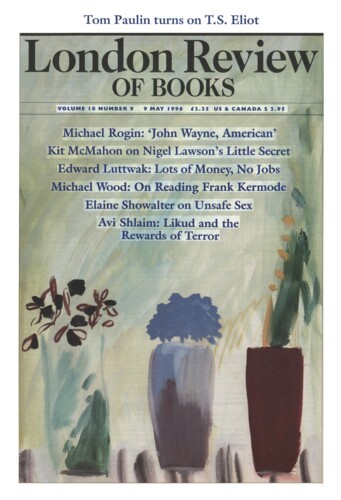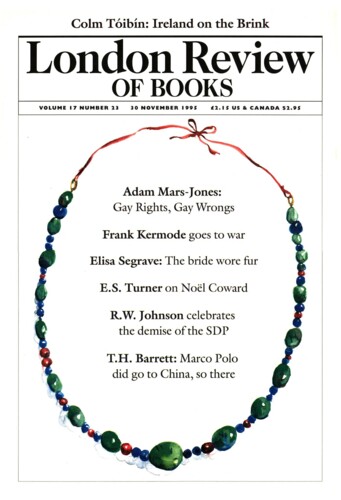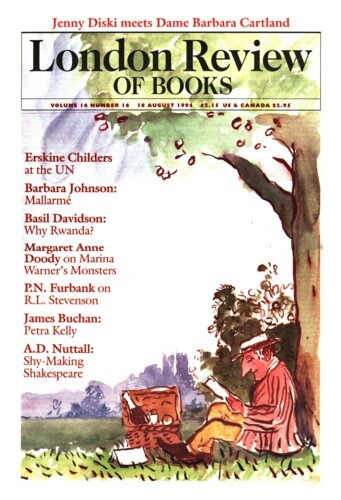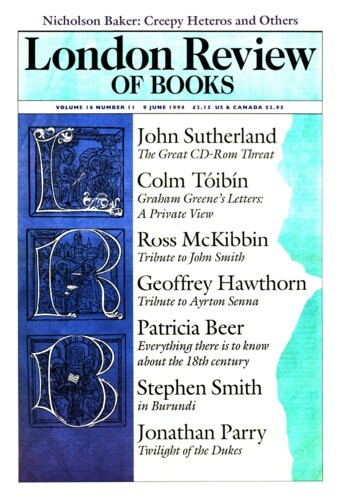Avi Shlaim
Avi Shlaim, a fellow of St Antony’s College, Oxford, is the author of The Iron Wall: Israel and the Arab World.
The Fighting Family
Avi Shlaim, 9 May 1996
Menachem Begin and his Likud union of nationalist and liberal parties won their first electoral victory on 17 May 1977, bringing to an end three decades of Labour rule. The Likud was to dominate Israeli politics for the next 15 years. Colin Shindler’s book provides the first comprehensive survey of the Party’s origins, rise and decline, while paying particular attention to the role played by its successive leaders.
Overtaken by Events
Avi Shlaim, 30 November 1995
Yitzhak Rabin, who was assassinated earlier this month by a right-wing extremist claiming to act in the name of God, inflicted more punishment and pain on the Palestinians than any other Israeli leader. As Chief of Staff in 1967, he presided over Israel’s spectacular military victory and the capture of the West Bank. For the next 25 years, in various capacities, he tried to hold on to the Occupied Territories by brute force. Ironically, it was his brutality towards the Palestinians that earned him his reputation inside Israel as a responsible and reliable politician. But the policy of force had been overtaken by events. Consequently, during his second term as prime minister, which began in June 1992, Rabin the predator began to mutate into Rabin the peacemaker.
Israel’s Dirty War
Avi Shlaim, 18 August 1994
Benny Morris is one of the most original and prolific contributors to the new or revisionist Israeli historiography of the Arab-Israeli conflict. What distinguishes the new historians most clearly from the traditionalists is that they are critical of the claims made by Israeli governments, claims which were turned into national myths and as such continue to influence popular attitudes to the Arabs even now.
It can be done
Avi Shlaim, 9 June 1994
Of all Zionist slogans, the most persuasive has always been Israel Zangwill’s ‘a land without a people for a people without land’. Had this slogan been true, there would have been no conflict; the Jews could have peacefully realised their dream of statehood in their Biblical homeland. Unhappily, an Arab community had lived on the land for centuries and its refusal to share it with the Jewish immigrants from Europe spawned the conflict which reached its climax in 1948 with the creation of the State of Israel and the uprooting and dispersal of some 730,000 Palestinians.
Pieces about Avi Shlaim in the LRB
The Great Lie: Israel
Charles Glass, 30 November 2000
An Israeli Jewish woman told me a story about her father’s return, many years later, to the house in Vienna that his family had abandoned in 1938. More than any of the other possessions he...
My Israel, Right or Wrong
Ian Gilmour, 22 December 1994
The foreign policy record of the Clinton Administration has been dismal. Even when the United States has shown more sensible and decent inclinations than Europe, as over Bosnia, the White House...
Cleansing the Galilee
David Gilmour, 23 June 1988
The Palestinian refugee problem was created forty years ago and seems no nearer a solution as it enters its fifth decade. The 750,000 people who left their towns and villages in 1948 have...
Read anywhere with the London Review of Books app, available now from the App Store for Apple devices, Google Play for Android devices and Amazon for your Kindle Fire.
Sign up to our newsletter
For highlights from the latest issue, our archive and the blog, as well as news, events and exclusive promotions.




